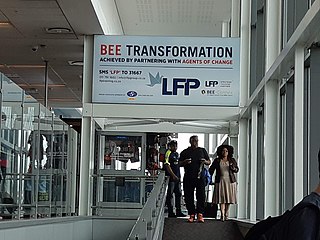
The economy of South Africa is the second largest in Africa and the most industrialized, technologically advanced, and diversified economy in Africa. South Africa is an upper-middle-income economy, one of only eight such countries in Africa. Following 1996, at the end of over twelve years of international sanctions, South Africa's nominal gross domestic product (GDP) almost tripled to a peak of US$416 billion in 2011. In the same period, foreign exchange reserves increased from US$3 billion to nearly US$50 billion, creating a diversified economy with a growing and sizable middle class, within two decades of ending apartheid.

The United Nations Economic and Social Council is one of the six principal organs of the United Nations, responsible for coordinating the economic and social fields of the organization, specifically in regards to the fifteen specialised agencies, the eight functional commissions, and the five regional commissions under its jurisdiction.

The New Partnership for Africa's Development (NEPAD) is an economic development program of the African Union (AU). NEPAD was adopted by the AU at the 37th session of the Assembly of Heads of State and Government in July 2001 in Lusaka, Zambia. NEPAD aims to provide an overarching vision and policy framework for accelerating economic co-operation and integration among African countries.

The Organization of the Black Sea Economic Cooperation (BSEC) is a regional international organization focusing on multilateral political and economic initiatives aimed at fostering cooperation, peace, stability and prosperity in the Black Sea region. It traces its origin to 25 June 1992, when Turkish President Turgut Özal and leaders of ten other countries gathered in Istanbul and signed the Summit Declaration and the "Bosphorus Statement". BSEC Headquarters – the Permanent International Secretariat of the Organization of the Black Sea Economic Cooperation – was established in March 1994, also in Istanbul.

Black Economic Empowerment (BEE) is a policy of the South African government which aims to facilitate broader participation in the economy by black people. A form of affirmative action, it is intended especially to redress the inequalities created by apartheid. The policy provides incentives – especially preferential treatment in government procurement processes – to businesses which contribute to black economic empowerment according to several measurable criteria, including through partial or majority black ownership, hiring black employees, and contracting with black-owned suppliers. The preferential procurement aspect of BEE has been viewed as paradigmatic of a sustainable procurement approach, whereby government procurement is used to advance social policy objectives. So-called "BEE deals" – transactions aiming to increase black ownership of large businesses – have been conducted on a large scale, with BEE transactions concluded between 1994 and 2005 valued at between R150 billion and R285 billion.

The U.S. African Development Foundation (USADF) is an independent U.S. government agency established by Congress in 1980 to invest directly in African grassroots enterprises and social entrepreneurs. USADF's investments aim to increase incomes, revenues, and jobs by promoting self-reliance and market-based solutions to poverty. USADF targets marginalized populations and underserved communities in the Sahel, Great Lakes, and the Horn of Africa. It partners with African governments, other U.S. government agencies, private corporations, and foundations to achieve transformative results.

The Infrastructure Consortium for Africa (ICA) was launched at the 2005 G8 Gleneagles Summit, with the mission to help improve the lives and economic well-being of African people by supporting and promoting increased infrastructure investment from both public and private sources.

The Development Bank of Southern Africa (DBSA) is a development finance institution wholly owned by the Government of South Africa. The bank intends to "accelerate sustainable socio-economic development in the Southern African Development Community (SADC) by driving financial and non-financial investments in the social and economic infrastructure sectors".
The Skills Development Act97 of 1998 is a law enacted in South Africa in 1998.

The Public Investment Corporation (PIC) is a South African state-owned entity (SOC) with R2.548 trillion of assets under management as of 31 March 2022. It is Africa's largest asset manager. Established in 1911, it holds large stakes in several South African companies, and is one of the entities through which the government implements its policy of Broad-Based Black Economic Empowerment. The PIC is also responsible for investing in the South African Government Employees Pension Fund (GEPF).

Ebrahim Patel is a South African politician and former trade unionist who has been Minister of Trade, Industry and Competition since May 2019. He previously served as Minister of Economic Development from 2009 to 2019.
The Federal Ministry of Budget and Economic Planning is one of the Federal Ministries of Nigeria.
The Eurasian Development Bank (EDB) is an international development finance institution investing in the development of the economies, trade and other economic ties, and integration in Eurasian countries. The EDB was founded in 2006 and is headquartered in Almaty, Kazakhstan. The Bank has a branch in St. Petersburg and representative offices in Nur-Sultan, Bishkek, Dushanbe, Yerevan, Minsk, and Moscow.

The Grassroots Business Fund is a non-profit organization based in Washington, DC. It has field offices in Kenya, Peru, and India. Their mission is to build and support high-impact enterprises that provide sustainable economic opportunities to thousands of people at the base of the economic pyramid. These enterprises are grassroots business organizations in developing countries that empower large numbers of the poor as producers of income-generating commodities and products, as consumers of affordable goods and services, and as independent entrepreneurs. GBF actively supports enterprises throughout Latin America, Africa, India, and Southeast Asia.
The Tony Elumelu Foundation (TEF) is an African non-profit organization founded in 2010 by Tony O. Elumelu and headquartered in Lagos, Nigeria. It is a pioneer member of the Global Impact Investment Rating System (GIIRS). So far, the Foundation has empowered over 18,000 African entrepreneurs across 54 African countries.

The Sustainable Development Goals (SDGs) or Global Goals are a collection of seventeen interlinked objectives designed to serve as a "shared blueprint for peace and prosperity for people and the planet, now and into the future." The short titles of the 17 SDGs are: No poverty (SDG 1), Zero hunger (SDG 2), Good health and well-being (SDG 3), Quality education (SDG 4), Gender equality (SDG 5), Clean water and sanitation (SDG 6), Affordable and clean energy (SDG 7), Decent work and economic growth (SDG 8), Industry, innovation and infrastructure (SDG 9), Reduced inequalities (SDG 10), Sustainable cities and communities (SDG 11), Responsible consumption and production (SDG 12), Climate action (SDG 13), Life below water (SDG 14), Life on land (SDG 15), Peace, justice, and strong institutions (SDG 16), Partnerships for the goals (SDG 17).

Policies advocating Middle East economic integration aim to bring about peace, stability, and prosperity in the Middle East, which they believe can only be sustained over the long run via regional economic cooperation.
Dr. Sailendra Narain is a development finance specialist born in Nawadah, Bihar Province, India. For over 40 years, Narain has been a pioneer in developing the global SME sector. His specialities include: designing policy frameworks for SME Growth, establishing SME financing programs in banking and development financial institutions, and capacity building for SMEs with a focus on Entrepreneurship.
Science and technology in Uganda examine government efforts to develop a national innovation system and the impact of these policies.
In South Africa the Department of Public Enterprises is the shareholder representative of the South African Government with oversight responsibility for state-owned enterprises in key sectors. Some companies are not directly controlled by the Department of Public Enterprises, but by various other departments. Further, not all state owned entities are registered as companies.












